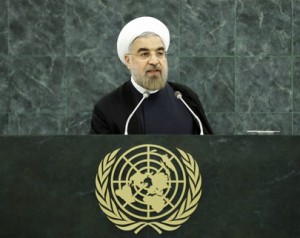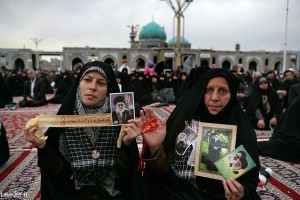As neocons look forward to dominant roles in a Clinton-45 administration, they are continuing their attacks on the Iran nuclear deal, thus keeping hope alive to eventually bomb-bomb-bomb Iran, as ex-CIA analyst Paul R. Pillar describes.
By Paul R. Pillar
The never-say-die efforts to kill the Iranian nuclear agreement have been taking some strange turns lately. Two in particular.
One is that some of the same opponents who, before the agreement was adopted, spent much energy berating the terms of the agreement are now focusing instead on criticizing certain actions by the U.S. administration toward Iran that the opponents assert are not among the terms of the agreement, and that the opponents say should not be taken for that very reason. The assertions are incorrect.
The issues at hand mostly concern the stickiness of the U.S. sanctions system and the persistence of fears among European banks and others about doing any business with Iran — even business that is permitted under the sanctions relief granted as part of the nuclear agreement. Efforts by U.S. officials to undo some of the stickiness are not beyond the obligations of the agreement; they are a necessary part of implementing terms that are an intrinsic and fundamental aspect of the bargain incorporated in the agreement.
Another, lesser, issue that has received comment concerns U.S. purchase of some of the heavy water that, under the agreement, Iran must remove from its stockpiles. Any such purchase is a direct facilitation of the carrying out by Iran of obligations that lessen its nuclear capabilities.
The opponents cannot have it both ways: first saying the terms were terrible and then saying what’s terrible is not to adhere strictly to the terms — or rather, to the opponents’ newest interpretation of the terms. If the agreement really says what the opponents now say it says, they should have been delighted with the document that emerged from the negotiations — one that, according to their interpretation, would have imposed all of the same limitations and scrutiny on Iran’s nuclear program that the actual accord does, but with almost no economic benefit accruing to Iran and even with the Iranians incurring additional economic loss in the form of expensively produced heavy water being poured down the sewer.
Another strange turn has come within the last week in the form of attention to a profile of presidential aide Ben Rhodes written by David Samuels and appearing in the New York Times Sunday magazine. If this piece was written to be exploitable by opponents of the nuclear agreement, that is not surprising given that the writer is a confirmed opponent himself. The picture that Samuels conveys is of Rhodes as a master manipulator of public perceptions who got the press that was covering the Iran negotiations to eat out of his hand in a way that conveyed false impressions of what the White House was up to.
Now, whatever one may think of Ben Rhodes, and even if one were to believe that the press covering U.S. foreign relations and security policy were as dumb and dependent as portrayed, there is no there there. There were no impressions, manipulated or otherwise, that ought to cause anyone any heartburn.
One of the supposed instances of manipulated and false impressions is that the administration contended it didn’t do anything on this issue until after Hassan Rouhani was elected president of Iran in September 2013 despite there having been some earlier secret U.S.-Iranian talks. In fact, the earlier talks have been well known for some time and had been reported long ago by that supposedly gullible press.

Iran’s President Hassan Rouhani addressing the United Nations General Assembly on Sept. 24, 2013. (UN Photo)
Moreover, it would have been surprising, and disappointing to anyone who would like the makers of U.S. foreign policy to be diligently looking ahead and considering all possibilities for advancing U.S. interests, if the administration had not tried to reconnoiter what the possibilities were for negotiating restrictions on the Iranian nuclear program.
And Rouhani’s election did make a significant difference, both in bringing into office on the Iranian side a team with the knowledge and commitment to reach such an agreement, and in rendering irrelevant on the American side the political difficulty of any major dealings with the loathsome Mahmoud Ahmadinejad. So where’s the deception, and what’s the problem?
The Samuels piece also suggests that the manipulator Rhodes got people to believe that the administration’s main purpose in negotiating the agreement was nuclear proliferation but that it really had other objectives in mind having to do with broader Middle Eastern matters. But the Obama administration wasn’t the one going out of its way to talk up an Iranian nuclear threat, even though other administrations have been known to talk up such threats to pursue other agendas. This time there was plenty of agitation from other sources about the danger of an Iranian nuke.
The agreement certainly needs to be assessed, pro or con, primarily in terms of nuclear nonproliferation, and it is in such terms that nonproliferation specialists have overwhelmingly endorsed the agreement. The agreement also needs to be assessed, pro or con, in terms of other effects it may have on regional politics and stability. And it was so assessed in the public debate; certainly the con side addressed it especially vigorously in such terms — you know, all that talk we heard about how Iran supposedly would be “emboldened” to do all sorts of “nefarious” things in the region. So where’s the deception, and how did it affect in any way the debate on the agreement?
The suggestion of duplicity with Ben Rhodes pulling strings from his West Wing office reminds one of those teasers for the eleven o’clock news that are phrased as a question: “Is there…[some shocking development, if it existed]?” only to find out, if one stays up and tunes in to the news broadcast, that the answer is: no, there isn’t.
Each of these strange turns in the tactics of the would-be agreement-killers is an additional example of what we saw so much of when debate on the agreement was most intensive last year: a grasping by the opposition for any straw to raise any kind of doubt about the agreement, however little sense the arguments made.
Paul R. Pillar, in his 28 years at the Central Intelligence Agency, rose to be one of the agency’s top analysts. He is now a visiting professor at Georgetown University for security studies. (This article first appeared as a blog post at The National Interest’s Web site. Reprinted with author’s permission.)


It really doesn’t matter what kind of treaty was signed, we know or, at least should understand, that the US has absolutely no intention of honouring anything it has signed with Iran. The goal all along has not only been to invade Iran and get the oil but to destroy yet another ancient culture and rewrite its history to suit the grand narrative of capitalism’s oligarchs, not only as “liberators” of a supposedly primitive and backward people, but to render everything that is not extracable and fungible, including and especially the lives of the people of the entirety of the Middle East, meaningless.
C M Concepcion, Glasgow, Scotland
THE NON-EXISTENCE OF JCPOA
” Efforts by U.S. officials to undo some of the stickiness are not beyond the
obligations of the agreement; they are a necessary part of implementing terms
that are an intrinsic and fundamental aspect of the bargain incorporated in the
agreement.” —Paul Pillar (above)
The US and its allies and clients never agreed in good faith to this
agreement. There never was an “agreement.”
Iran should withdraw from NPT, from JCOPA (the Iran “nuke deal”)
including “Additional Protocols”. It has already been invited
by Russia to take a more active role in SCO (Shanghai Cooperative
Organization). As a sovereign nation Iran should make such coalitions
as it feels appropriate with other nations of its choosing. Without
asking permission as it were from Israel and the US.
According to Gareth Porter in MANUFACTURED CRISIS…this was
once considered by Iran.
Not irrelevant is the fact that no reduction in sanctions on Iran is
in the foreseeable future whichever candidate wins the current
US election cycle.
The main issues would not be in any immediate declaration of
war on another nation while it would guarantee Iran the
ability to act as it sees fit. Any agreements with any foreign
nations would be premised on mutual economic and geo-
political benefits to all parties involved.
From afar (to wit from this observer’s opinion) and based on
an understanding to the current US political climate, there seems
no reason for hope for any JCPOA or its sequel. The US has
failed to comply. JCOP is dead. Israel has through
its own means and via US policies prevailed.
—Peter Loeb, Boston, MA USA
US General Wesley Clark, in a candid interview, told the whole world, that the USA would wage war with 7 countries, within a 5 year time frame. Iran was on that list, but not yet though, after Syria there is Lebanon, they will be bombed to a pile of rubble, The population of Lebanon have already begun to vacate the country in anticipation, yes folks, there is an exodus in play. Then it will be Iran’s turn, everything else is the Hot Shot War Monger Mavericks playing footsies under the table. Where all these people will end up is anyones guess, no doubt the USA will take it’s fair share.
Dear Mr Pillar,
After realizing the Saddam “anthrax scare” turned out to be a fraudulent ploy(one among many) to goad us into bombing Iraq……
After realizing the notorious Iran “laptop” filled with “incriminating” evidence, turned out to be another fraudulent deception,to goad us into bombing Iran…
How much patience should Americans have, with all these, Lie-us-into-bombing, people ?
And…… if they have to lie us into war, by fabricating these phony incidents and bogus evidence…how much integrity do their real motives have ?
Come to think of it, Mr Pillar, what kind of sick individuals would lie us into “war” , at all ?
I mean, really, when is there going to be an honest accounting for all these deceptions foisted upon us, Mr Pillar ?
Why is defrauding the American people into perpetual conflicts , okay ?
Isn’t this as much a form of “terrorism” as anything else ?
Isn’t it the worst form there is ?
Ben Rhodes did speak a truth that offended the western media (MSM), that they lack the ability to critique any claims made by the Administration on foreign affairs. One example is how they dutifully repeated how Iran had violated U.N. sanctions by testing ballistic missiles and this justified new sanctions by Congress.
The JCPOA specifically negated all previous U.N. sanctions against Iran and replaced it with resolution 2231. See termination 7. (a). It replaces it with a ‘call for Iran to not undertake ballistic missile testing’, see Annex B. 3. https://web.archive.org/web/20150819092747/http://www.un.org/en/sc/inc/pages/pdf/pow/RES2231E.pdf
Even today, this line is repeated by the MSM and hostile Neocons in some form or another. I got clued in because I read that the Russians called out the U.S. on this falsehood, I think by the Russian Insider. This tells me two things about our MSM.
1. They are incapable of analyzing Administration statements against public records by themselves.
2. They won’t even do this if a foreign source does this for them (in this case the evil Russians).
This is just one example, I’d say that their unflinching narrative in their coverage of the war in Syria, Ukraine, … follows the same pattern.